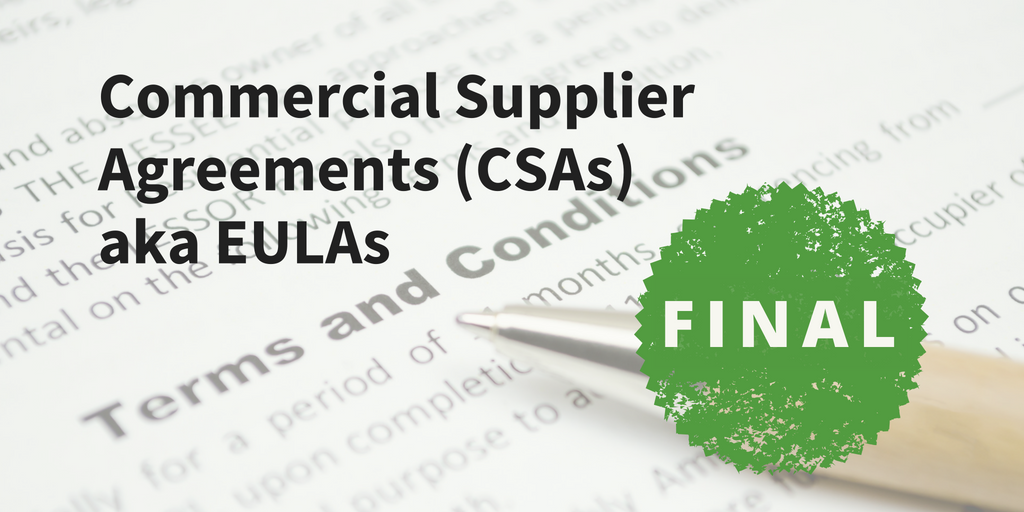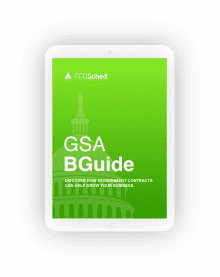
If your company provides a software solution, and holds or is pursuing a GSA Schedule Contract, you may have heard a lot of talk recently about Commercial Supplier Agreements (CSAs). Commercial supplier agreements are terms and conditions intended to create a binding, legal obligation with the end user. Your company may refer to them as Terms of Use, Terms of Service (TOS), End-User License Agreements (EULAs), or Software License Agreements.
While private end users don’t have much choice in accepting the terms and conditions that typically accompany a software solution, the government is another story. Chances are your company’s standard terms and conditions contain clauses that are unacceptable to the U.S. federal government.
Regardless of what you call your terms and conditions or how you recognize an end user’s acceptance of those terms and conditions (shrink-wrap, click-wrap, browse-wrap), according to the Federal Acquisition Regulation (FAR) they are a CSA. Any item with a CSA cannot be placed on the GSA Schedule until GSA’s legal division reviews the CSA to negotiate clauses that directly conflict or create ambiguity with federal law.
Although, the terms and conditions of CSAs vary, a large percentage share common, core clauses. To save time reviewing and negotiating CSAs, GSA issued a class deviation in 2015 to establish a set of ground rules. The class deviation detailed 15 elements of CSAs that are non-negotiable. The deviation essentially says, if an item is subject to a CSA, the CSA is required to incorporate specific clauses (referred to as “commercial supplier agreements – unenforceable clauses”). These clauses take precedence over the CSA, potentially making some parts of the CSA null and void. This class deviation allowed GSA’s legal team to focus their time and effort on CSA terms not addressed in the class deviation.
The CSA – Unenforceable Clauses Language:
Below is a high-level overview of what the CSA – Unenforceable Clauses language states.
- Any CSA language that requires the ordering activity to “pay any future fees, penalties, interest, legal costs or to indemnify the Contractor or any person or entity for damages, costs, fees, or any other loss or liability” is:
- Unenforceable against the activity
- Non-binding to the ordering activity or authorized end user
- Considered stricken from the CSA
- All CSA’s incorporate clauses that address the following elements:
- Definition of contracting parties – the agreement may bind the ordering activity as an end user, but this cannot extend to employees of the ordering activity or people acting on behalf of the ordering activity.
- Contract formation – a contract cannot be created by a user opening a product, clicking a button, or viewing a page containing a link to terms and conditions (also known as: shrink-wrap, click-wrap, and browse-wrap)
- Vendor indemnity (vendor assumes control of proceedings) – the U.S. Department of Justice has the sole right to represent the U.S. in cases where the supplier is required to defend or indemnify the end user.
- Automatic renewals of term-limited agreements – CSA’s cannot renew automatically without prior express consent by an authorized ordering activity representative
- Future fees or penalties – are not allowed. This includes travel costs, surcharges, late payment penalty, liquidated damages, and audit costs. Some of these items are governed by existing federal regulations (e.g. federal travel regulations establish payment of travel costs)
- Taxes – unless specifically agreed to in the ordering activity contract, taxes and surcharges cannot be invoiced until they are submitted to a Contracting Officer to determine applicability.
- Payment terms or invoicing (late payment) – due date for invoices is either 10 days from receipt of proper invoice or 10 days from acceptance of the supplies/services, whichever occurs last. Late payments are governed by the Prompt Payment Act.
- Automatic incorporation/deemed acceptance of third party terms – the ordering activity and government users are not bound by click-wrap or browse-wrap agreements.
- State/foreign law governed contracts – CSA’s cannot subject the ordering activity to state or local laws. Additionally, they cannot require dispute resolution in a venue that conflicts with federal law.
- Equitable remedies, injunctions, binding arbitration – binding arbitration for disputes can only be used if specifically authorized by agency guidance. Equitable or injunctive relief (e.g. attorney fees) are only allowed when explicitly provided by statute.
- Unilateral termination of supplier agreement by supplier – a CSA cannot allow the supplier to unilaterally revoke, terminate, or suspend rights granted the ordering activity except as allowed under the contract.
- Unilateral modification of supplier agreement by supplier – are only allowed for changes that are not material.
- Assignment of supplier agreement or Government contract by supplier – with the exception of assigning rights to receive payment, a CSA cannot allow the agreement to be assigned, or any rights or obligations delegated, without the order activity’s prior approval
- Confidentiality of supplier agreement terms and conditions – the agreement and the contract price list cannot be deemed confidential information.
- Audits (automatic liability for payment) – if the supplier requests an audit, the supplier is required to pay for that audit and will not be eligible to receive reimbursement from the ordering activity. If the audit finds discrepancies that result in a charge to the ordering activity, the charges must be invoiced in accordance with the underlying ordering activity contract. If the ordering activity disputes the charge, payment is not due until resolution of the dispute.
What is Happening Now?
Why are we discussing CSAs now? These unenforceable terms are not new. GSA has been working for years to streamline the review process for license agreements. Around 2011/2012, GSA introduced a EULA Fail Chart for GSA IT Schedule 70. The Fail Chart detailed 14 clauses that companies should consider removing/amending before submitting to GSA for review.
As we discussed earlier, GSA issued the class deviation in 2015 to formally establish unenforceable terms. In 2016, GSA proposed a rule to amend the General Services Administration Acquisition Regulation (GSAR) and in February of 2018 the final rule went into effect. Just last month, GSA began updating Schedule solicitations to incorporate the final rule.
What has changed between the class deviation and the final rule?
Between the class deviation in 2015 and the final rule of 2018, a few things have changed. Below is an overview of the most significant changes.
- Order of Precedence. The final rule places addendums, including Commercial Supplier Agreements ahead of the solicitation provisions in order of precedence.
- Full Text Submission Requirement. You no longer need to include the “full” text for all of your terms and conditions when you submit them to GSA. GSA clarified during a recent webinar – you still need to submit your terms and conditions; however, the full text of additional terms may be referenced within your CSA.
- Bilateral Modification Required for Material Changes. The final rule states that a bilateral modification is required to incorporate CSA revisions that materially change the terms of the contract. Material changes include:
- Terms that change the ordering activity’s rights or obligations
- Terms that increase ordering activity prices
- Terms that decrease overall level of service
- Terms that limit any other ordering activity right addressed elsewhere in this contract
What does this mean for current and prospective GSA Schedule Contractors
Companies will continue to submit the license agreements to GSA for review. While technically, the agreements can be submitted as-is, GSA would like you to proactively strike/remove clauses that are considered unenforceable.
Existing contractors will have to accept the CSA mass modification when it is issued. You must accept the CSA mass modification before you have the option to pursue the OLM SIN mass modification.
